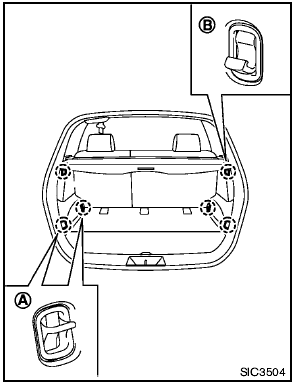 Nissan Rogue: Securing the load
Nissan Rogue: Securing the load

There are tie down hooks located in the cargo area as shown. The tie down hooks can be used to secure cargo with ropes or other types of straps.
Do not apply a total load of more than 22 lb. (98 N) to a single hook A or 7 lb. (31 N) to a single hook B (if so equipped) when securing cargo.

- Properly secure all cargo with ropes or straps to help prevent it from sliding or shifting. Do not place cargo higher than the seatbacks. In a sudden stop or collision, unsecured cargo could cause personal injury.
- The child restraint top tether strap may be damaged by contact with items in the cargo area. Secure any items in the cargo area. Your child could be seriously injured or killed in a collision if the top tether strap is damaged.
- Do not load your vehicle any heavier than the GVWR or the maximum front and rear GAWRs. If you do, parts of your vehicle can break, tire damage could occur, or it can change the way your vehicle handles.
This could result in loss of control and cause personal injury.
 Vehicle load capacity
Vehicle load capacity
Do not exceed the load limit of your vehicle
shown as “The combined weight of occupants
and cargo” on the Tire and Loading
Information label. Do not exceed the
number of occupants shown ...
 Loading tips
Loading tips
- The GVW must not exceed GVWR or
GAWR as specified on the F.M.V.S.S./
C.M.V.S.S. certification label.
- Do not load the front and rear axle to
the GAWR. Doing so will exceed the
GVWR.
- ...
See also:
Shifting Procedures
NOTE: If any of the requirements to select a new
transfer case position have not been met, the transfer case
will not shift, the indicator light for the previous position
will remain on, and the ...
Changing wheels and tires
Tire rotation
NISSAN recommends rotating the tires
every 7,500 miles (12,000 km). (See “Flat
tire” in the “6. In case of emergency”
section for tire replacing procedures.)
As soon as ...
Side lamps (green)
Side lamps (green)
Illuminates when the side lights are
switched on. ...
